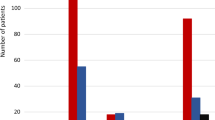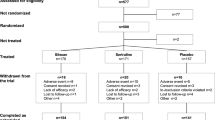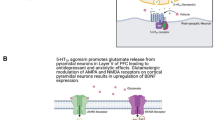Abstract
Objective
To compare the long-term efficacy and safety of aripiprazole with olanzapine in patients with either acute relapsing or chronic, stable schizophrenia.
Materials and methods
A 52-week, open-label extension to a 26-week, multicenter, randomized, double-blind, placebo-controlled trial in patients with chronic schizophrenia. Patients who completed the initial treatment or who met the protocol definition of relapse after ≥2 weeks of double-blind treatment were randomized to aripiprazole (15–30 mg/day, n = 104) or olanzapine (10–20 mg/day, n = 110) for 52 weeks.
Results
Sixty-nine percent of patients completed the study. Efficacy improvements were similar between groups at endpoint, mean reductions in Positive and Negative Syndrome Scale (PANSS) Total scores from baseline for patients completing the study (observed cases) were similar in chronic stable patients (aripiprazole, −7.94; olanzapine, −7.36) and in patients with acute relapse (aripiprazole, −31.19; olanzapine, −29.55). Olanzapine-treated patients reported more extrapyramidal symptoms (EPS)-related adverse events (18%) than aripiprazole-treated patients (10%). No significant differences in EPS were seen between treatments at endpoint. Olanzapine was associated with significantly greater weight gain than aripiprazole at all time points (week 52 [LOCF]: +2.54 vs +0.04 kg; p < 0.001). Changes in fasting glucose and lipid levels at endpoint favored aripiprazole over olanzapine, with significant differences observed for total cholesterol, low- and high-density lipoprotein. While differences observed for changes in fasting glucose and triglycerides favored aripiprazole, they were not statistically significant.
Conclusion
Aripiprazole showed similar efficacy to olanzapine for long-term treatment of acutely psychotic and chronic, stable schizophrenia patients, with a lower liability for weight gain or increased lipid levels.




Similar content being viewed by others
References
APA (1997) Practice guideline for the treatment of patients with schizophrenia. American Psychiatric Association. Am J Psychiatry 154:1–63
Cornblatt B, Kern RS, Carson WH, Ali MW, Luo X, Green M (2002) Neurocognitive effects of aripiprazole versus olanzapine in stable psychosis. Int J Neuropsychopharmacol 5(Suppl 1):S185
Grundy SM, Pasternak R, Greenland P, Smith S Jr, Fuster V (1999) Assessment of cardiovascular risk by use of multiple-risk-factor assessment equations: a statement for healthcare professionals from the American Heart Association and the American College of Cardiology. Circulation 100:1481–1492
Kane JM, Carson WH, Saha AR, McQuade RD, Ingenito GG, Zimbroff DL, Ali MW (2002) Efficacy and safety of aripiprazole and haloperidol versus placebo in patients with schizophrenia and schizoaffective disorder. J Clin Psychiatry 63:763–771
Kasper S, Lerman MN, McQuade RD, Saha A, Carson WH, Ali M, Archibald D, Ingenito G, Marcus R, Pigott T (2003) Efficacy and safety of aripiprazole vs haloperidol for long-term maintenance treatment following acute relapse of schizophrenia. Int J Neuropsychopharmacol 6:325–337
Leucht S, Barnes TR, Kissling W, Engel RR, Correll C, Kane JM (2003) Relapse prevention in schizophrenia with new-generation antipsychotics: a systematic review and exploratory meta-analysis of randomized, controlled trials. Am J Psychiatry 160:1209–1222
Marder SR (1999) Antipsychotic drugs and relapse prevention. Schizophr Res 35:S87–S92
McEvoy JP, Scheifler PL, Frances A (1999) Treatment of schizophrenia 1999. The expert consensus guideline series. J Clin Psychiatry 60:3–80
McQuade RD, Stock E, Marcus R, Jody D, Gharbia NA, Vanveggel S, Archibald D, Carson WH (2004) A comparison of weight change during treatment with olanzapine or aripiprazole: results from a randomized, double-blind study. J Clin Psychiatry 65:47–56
Miller AL, Hall CS, Buchanan RW, Buckley PF, Chiles JA, Conley RR, Crismon ML, Ereshefsky L, Essock SM, Finnerty M, Marder SR, Miller del D, McEvoy JP, Rush AJ, Saeed SA, Schooler NR, Shon SP, Stroup S, Tarin-Godoy B (2004) The Texas Medication Algorithm Project antipsychotic algorithm for schizophrenia: 2003 update. J Clin Psychiatry 65:500–508
NIH/NHLBI (1998) Clinical guidelines on the identification, evaluation, and treatment of overweight and obesity in adults—the evidence report. NIH Publication No. 98-4084. National Institutes of Health/National Heart, Lung and Blood Institute, Bethesda, MD
Pigott TA, Carson WH, Saha AR, Torbeyns AF, Stock EG, Ingenito GG (2003) Aripiprazole for the prevention of relapse in stabilized patients with chronic schizophrenia: a placebo-controlled 26-week study. J Clin Psychiatry 64:1048–1056
Potkin SG, Saha AR, Kujawa MJ, Carson WH, Ali M, Stock E, Stringfellow J, Ingenito G, Marder SR (2003) Aripiprazole, an antipsychotic with a novel mechanism of action, and risperidone vs placebo in patients with schizophrenia and schizoaffective disorder. Arch Gen Psychiatry 60:681–690
Weiden PJ, Miller AL (2001) Which side effects really matter? Screening for common and distressing side effects of antipsychotic medications. J Psychiatr Prac 7:41–47
Acknowledgements
The principal investigators of this study were as follows: Uryi Alexandrovsky, MD, Serbsky National Research Centre for Social and Forensic Psychiatry, Moscow, Russia; Mohammed Bari, MD, Synergy Clinical Research Center, California, USA; Valeriy Bitensky, MD, Department of Psychiatry, Ukraine; David W. Brown, MD, Community Clinical Research Inc., Texas, USA; Michail Burducovsky, MD, 4th Psychiatric Hospital, St Petersburg, Russia; Wlodzimierz Chrzanowski, MD, Psychiatric Clinic of Medical Academy in Bialystok, Poland; Vladislav Demchenko, MD, Ukraine Psychiatric Association, Ukraine; Ivan Drabek, MD, Psychiatricka Lecebna, Czech Republic; Carlos Figueroa, MD, Research Strategies Inc., California, USA; Janusz Janczewski, MD, Regional Mental Hospital, Poland; Mieczyslaw Janiszewski, MD, Regional Psychiatric Center, Poland; Svetlana E. Kazakova, MD, Department of Psychiatry Lugansk State Medical University, Ukraine; Zurab Kekelidze, MD, Serbsky National Research Centre for Social and Forensic Psychiarty, Russia; Mary Ann Knesevich, MD, St Paul Medical Center, Texas, USA; Alexander Kociubynsky, MD, Bekhterev Research Institute, Russia; Mark Lerman, MD, Alexian Brothers Behavioral Health Hospital, Illinois, USA; Adam F. Lowy, MD, Psychiatric Institute of Washington, Washington, USA; Vladimir Muchl, MD, Psychiatricka Lecebna Lnare, Czech Republic; Alexander Mouzitchenko, MD, State Medical Academy, Russia; Galina Panteleeva, MD, Clinical Department of Endogenous Mental Disorders and Affective States, Russia; David A. Sack, MD, Institute for Psychopharmacology Research, California, USA; Yuri L. Nuller, MD, Psychoneurological Research Institute, Russia; Viktor Samokhvalov, MD, Department of Psychiatry, Crimea State Medical University, Ukraine; Vladimir Tochilov, MD, Mechniokv Medical Academy, Russia; Tram K. Tran-Johnson, PharmD, PsyD, California Neuropsychopharmacology Clinical Research Institute, LLC, California, USA; Boris Tsygankov, MD, Moscow State University of Medicine and Stomatology, Russia; Rouslan Vovin, MD, PhD, Psychoneurological Research Institute, Russia. This study was sponsored by Bristol-Myers Squibb Company and Otsuka Pharmaceutical Company, Ltd.
Author information
Authors and Affiliations
Corresponding author
Rights and permissions
About this article
Cite this article
Chrzanowski, W.K., Marcus, R.N., Torbeyns, A. et al. Effectiveness of long-term aripiprazole therapy in patients with acutely relapsing or chronic, stable schizophrenia: a 52-week, open-label comparison with olanzapine. Psychopharmacology 189, 259–266 (2006). https://doi.org/10.1007/s00213-006-0564-3
Received:
Accepted:
Published:
Issue Date:
DOI: https://doi.org/10.1007/s00213-006-0564-3




